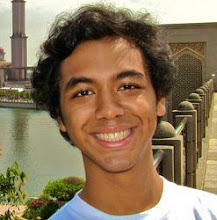Aaaah...Ramadan, the month of selfless sacrifice and pure devotion. Heaven breaks loose and everybody becomes an angel. Mosques are packed with people hoping to gain everything Ramadan has to offer. They go to Qur'an recitals and maybe try to finish all 114 surahs in 30 days (Kind late, but good luck!). Some participate in religious discussion groups to enrich their knowledge about Islam. In the last 10 days of the month, people go to their favorite mosques to do i'tikaf -devoting the night for God, only God, and nothing but God. Although I haven't quite reached that level, I believe that these practices are beneficial to us, like all religious practices are.
But those are not what I'm going to blog about. Instead, I'm writing about a practice unique to the fasting month (apart from watching those horrible Ramadan sinetrons or Islamic talkshows hosted by overpaid ustads): the tarawih prayer/salat. According to everyone else, this is a very recommended sunnah. It's not compulsory, but it earns you a giant truckload of good deeds - if you really want to count your blessings. Basically, tarawih is done like the plain ol' salat, only the number of rakaats differ. The "rule" states that it is performed in even number of rakaats, starting from two. In practice, people also differ: most people do 8 rakaats, 20 is also common, although 30 or 40 is not unheard of. Me? I personally prefer 8, if I'm in a mood to do tarawih at all. (I'm not that bad, but now you know that I don't walk with a halo over my head).
Now, that brings us to my annual experience at one of my relative's house. The family hosts a breaking-the-fast gathering every year, inviting extended families plus children and an ustad from an orphanage. It starts from more than an hour before magrib, and they (emphasis on they) do Qur'an recitals waiting for the azan magrib to be heard. No story to tell there...until tarawih. This particular ustad, who is the always the same year after year, does the tarawih in 20 rakaats, divided into 10 sets of 2 rakaats. Obviously, those 20 rakaats take more time than my preferred 8-rakaat prayer does; however, that's not the source of my agony.
The ustad, as the imam (leader of the congregation), loves to speed up all the prayers, surahs, and moves. Probably, he's trying to minimize the time required to perform all 20 rakaats, but his speed is somewhat untolerable. Coming from me, you just have to believe that he is obscenely fast. For one, his surah reading speed will humble any fast-talking gossiper you meet. Some may say that he's blessed with an agile tongue; I say he's ridiculous. Furthermore, he completes his salat moves (e.g. ruku' and sujud) faster than you can say "supercalifragilisticexpialidocious" or "hidup adalah perbuatan". When doing the sujud, my head hardly touches the prayer mat when he's starting the next move. And he left nothing unaccelerated, even the after-salat zikir sounds like random chants to the infidel untrained ears.
What's the point of all those 20 rakaats if their only meaning is a "quickie" with God, instead of a deep and full devotion to the Almighty. I don't know if the imam actually recites all the salat prayers, let alone if he does that correctly. For God's sake, he's the imam! He should show utmost piety to his congregation, not show off that he can finish the whole thing in a jiffy. Even I know that in salat, there's a principle called tuma'ninah which requires us to do every move and say every prayer with serenity, calmness, tranquility. These qualities are needed to help us understand what we're saying. The prayers won't mean anything if they just flew off like a bullet because after all, what we can gain from salat depends on how we take in its wonderful essences.
So please, spare us from your meaningless salat...It's far better to do 8 rakaat with your full, undivided attention than 20 without any benefit. Finally, I'd like to quote Bree from Desperate Housewives: "I go for worship, not for a workout."


No comments:
Post a Comment